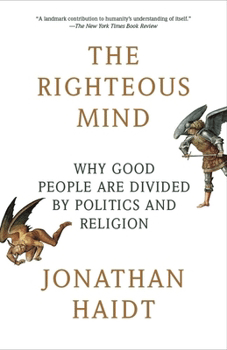Return to 3rd Quarter 2023 articles.

The Righteous Mind
by Jonathan Haidt, Vintage Books reprint © 2013
$18.00 paperback, 528 pages, ISBN-13: 978-0307455772

The subtitle of this well-written book is “Why Good People are Divided by Politics and Religion.” Haidt is a social psychologist and the Thomas Cooley Professor of Ethical Leadership at New York University's Stern School of Business. This book is a psychological discussion of why people believe what they believe. Haidt is not promoting religion or morality, and the book is an academic discussion using Darwinian theorizing to explain what we see in a wide range of areas that affect us all.
There are times when Haidt is downright brutal and shows why some of the weak parts of our civilization believe and function as they do. His analysis of politics and atheism is especially accurate and critical. Although not a believer, he treats religion fairly and accurately. He examines the question of why morality can and should exist and explains why moral standards differ between different groups.
This is not a book promoting biblical standards of morality, and Haidt's discussion of religion is very broad, viewing religion in a universalist framework. His treatment is accurate for most religions and most denominations. Haidt does not hold the Bible, or any religious book, as having absolute Truth. Since most religious belief systems are human-made, his evolutionary explanations are helpful and accurate.
The book has many quotes, and the documentation is very thorough. It shows the failure of atheism and secularism to produce workable moral frameworks to live by. Haidt's purpose is to promote a psychological approach to morality that allows humans on an academic level to “disagree more constructively.” However, trying to do that from a Darwinian belief system ignores the moral framework Jesus gave to promote peace and understanding. This is not a book for the average reader but would be helpful for college students and academics trying to understand the combative nature of today’s society.
